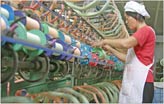Editorials
Subversion in a suitcase
Updated: 2011-06-17 07:37
(China Daily)
The exploitation of online technology by the United States for an invisible battle against target governments could challenge international relations as country borders are cast into shadow.
The US is sponsoring projects, such as the creation of secretive cell phone networks inside foreign countries and an "Internet in a suitcase" program, which will allow users to connect to independent wireless networks.
These new networks will allow opposition forces to circumvent government control of electronic communications in countries such as Iran and Libya.
The suitcase project relies on a version of "mesh network" technology, which can use devices like cell phones or personal computers to create an invisible wireless web without a centralized hub.
In other words, a voice, picture or e-mail can hop directly between the modified wireless devices - each one acting as a mini cell "tower" and phone - and bypass the official network.
The US is widely understood to already use cell phone networks in Afghanistan, Iraq and other countries for intelligence gathering.
In addition to the Obama administration's initiatives, there are almost a dozen independent ventures that also aim to make it possible for unskilled users to employ existing devices like laptops or smart phones to build a wireless network.
As usual, freedom of speech and democracy are the high-sounding rhetoric the US uses when selling its suitcase project or "shadow Internet".
The US State Department has carefully framed its support of such projects as promoting free speech and human rights, but it is clear that the policy is aimed at destabilizing national governments. This approach is, to say the least, controversial. It could plant the seeds of instability in countries that have governments that are not to the US' liking.
However, the technology the US is providing opposition forces in their bid to overthrow their legitimate governments is contrary to the stated aims of US foreign policy.
In his inaugural address on January 20, 2009, US President Barack Obama said the US will cooperate and pursue understanding with other nations.
The shadow Internet clearly contradicts this and will stir up more subversive activities in countries with governments the US doesn't like. It could also be used as a tool to collect secrets from other countries.
The US has also supported the development of software that preserves the anonymity of users who want to pass information along the government-owned Internet without getting caught.
Secretly developed by the US government, this new technology is a weapon in a covert cyber war intended to maintain the US' global dominance.
(China Daily 06/17/2011 page8)
Specials

When two are one
After a separation of 360 years, Huang Gongwang's famous Dwelling in the Fuchun Mountains has been made whole again.

Wealth of difference
Rich coastal areas offer contrasting ways of dealing with country's development

Seal of approval
The dying tradition of seal engraving has now become a UNIVERSITY major